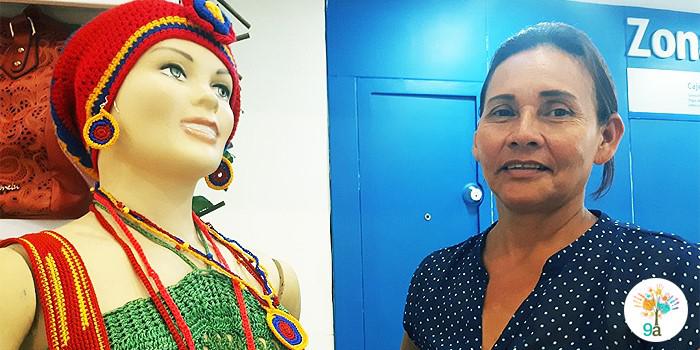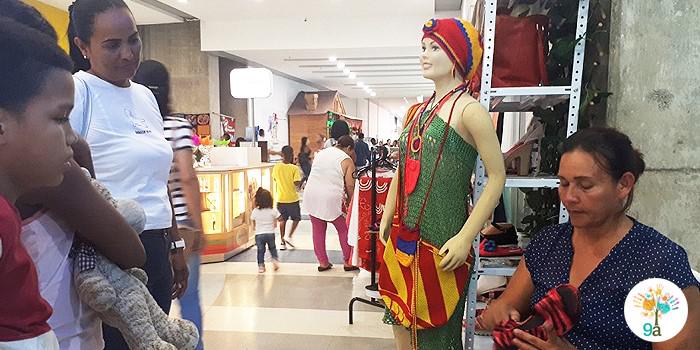
"I knew how to turn difficulties into opportunities"
With positive mentality. In this way, Edilma Cardona, victim of conflict, began to weave her entrepreneurial history. This Tuesday, April 9, commemorates the 'Day of Memory and Solidarity with the victims of armed conflict'.


This is what Edilma Cardona says, who, among crochet threads, stitches with two needles, chains, and double laps, has created real works of art that served to mitigate the aftermath of armed conflict, and the struggle that as a mother, she had to start with the disability of her son Jeison, for about 25 years.
Exactly that situation, even being young, made her decide to leave Apartadó to knock on doors as she narrates, in search of specialized attention for her son, while she supported herself by selling lottery, and that was when she not only witnessed a murder, but also was victim of injuries due to a stray bullet, at that moment with fear and impotence had to return to Apartadó.
"I had to move again to Apartadó because two or three days later, they came to ask about the lady who had a leg wounded, but that affected me a lot because Jeison was involved in a process of rehabilitation that improved the quality of life; he had multiple cerebral palsy, which improved when he received those therapies that were delayed when I had to move again to Apartadó".
Edilma had to learn about health laws in order to demand the rights of her son, she never forgets that one of the many doctors who saw her son coldly told her to only feed him without giving her a better chance of life. At only 22 years old, he had to travel with her son many times through the streets of Medellín.
"One is not used to the city and I was a young girl when I remembered this. They come to my memory, moments that today I know Medellin I walked from San Vicente de Paul hospital when I was diagnosed with Jeison: cerebral palsy with psychomotor insufficiency. More or less the doctor said that 'that child was not going to serve me for anything that would give him food and wait for him to die', that's why my tears, I took Jeison and walked for hours in the streets of Medellin".
Contrary to any diagnosis, the hardest for her, Jeison accompanied her for 25 years. "The first three years were very hard, every month we took him to the doctor, I dedicated myself to work for him, and I saw that it worsened; there that in the 90's I made the decision to go to Medellín and it was when after five years of being there, I suffered personal injuries".
These personal events and those caused by the armed conflict, brought pain to her life, but Edilma, far from despairing and losing strength, learned not only, as she says, to be resilient. "The harder things happened to me the stronger I became, before with a different character because society sometimes makes one hard, and I put on an armadillo breastplate, but I learned that if I have to cry, I can cry, that filled me of strength and drive to be an enterprising proactive woman and it was there that I started knitting, I had a restaurant ".
There are those who affirm that women are weavers by nature, and although Edilma discovered it out of necessity as she recognizes it, her talent has been improving. "One day I arrived and I realized that my mom could no longer support me with Jeison, I felt the need to leave that job for five years and dedicate myself to Jeison, I had to close and then to think about what I was going to live, until A neighbor asked me to knit some folders and she paid for them".
"I realized that I had not forgotten, that it was a gift that I had and I learned to develop it. I learned how to weave when I was eight years old, when I saw a lady sitting on the platform and I told my mother to buy the needles at that time, it only cost 200 COP, she made objections, but after so much insistence she bought them, then she took out molds from a magazine called Ganchito, I started making them identical, until a friend saw a backpack that I knitted and she told me that I had a group of women to teach and I was very scared because I learned it was like that ".
Thus, she began to weave her entrepreneurial history, with an always positive mentality, to make woven footwear, backpacks, wallets and purses, which little by little she has been making known in some footwear stores and service fairs.
Although she did not know at first about her rights as a victim, Edilma managed to declare herself as a victim of personal injury and displacement. She says that through humanitarian aid and compensation she has strengthened her business, has participated in service fairs, graduated as a bachelor in 2009, and decided to learn more. In addition, she ended up at SENA as a technologist in the formulation and evaluation of projects, now she dreams of finishing her career in business administration.
"I'm 52 years old but I feel 20 because health and specially mental, they are a gift from God, what we have at hand we must use it, if it is little used well if it is much better and share it with others". And this is what Edilma has done since she teaches how to weave other women victims like her, she leads a foundation that accompanies families that have people with disabilities, this she had been doing quietly, until she has had different recognitions and greater stability in her art.
The name of Edilma Cardona Durango was unknown to many, until December 11 when she was awarded the #AntenasDeOro award, the highest distinction that exalts and rewards people who contribute to society through their actions. This award is granted by Antena Estéreo, a recognized radio station in the Urabá region, which awarded it in the category of community merit.
An unexpected recognition, for her and that she was pleasantly moved because, as she says, her work has been silent, with no other pretension than to help those who want to get ahead. "Being the woman, I am today is the result of having sown on time", she concludes.






